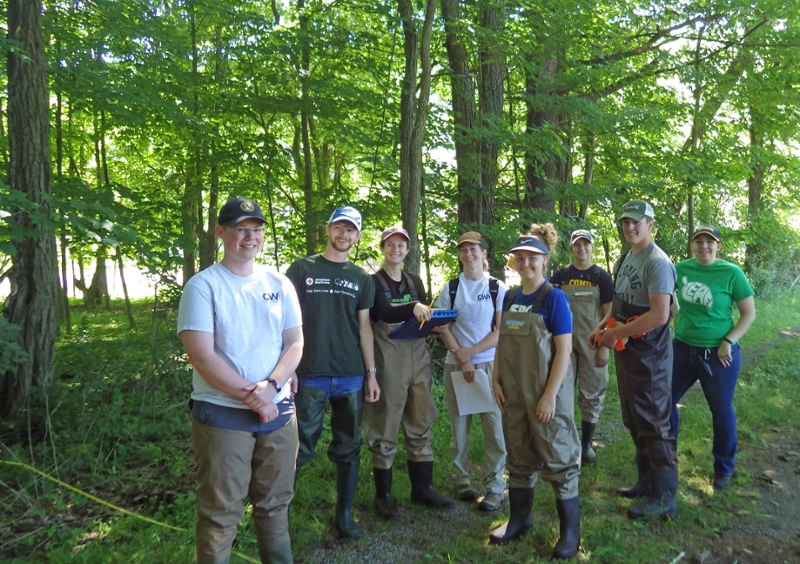
Download Image: Web
Eleven students from Lycoming College are participating in a ten-week summer internship through the College’s Clean Water Institute (CWI). The student interns will complete a variety of projects focused on Susquehanna River and tributary water quality monitoring, PA Unassessed Waters Fish surveys, and work associated with the Waterdale Environmental Center and the new Lycoming College field station on the Loyalsock Creek.
The CWI operates in coordination with the College’s Center for Enhanced Academic Experiences (CEAE), which provides students with a wide range of co-curricular experiences that help them to develop intellectually, professionally and personally. With a focus on global education, internships, and student-faculty research collaborations, the CEAE helps prepare students for graduate school, careers, and ultimately, meaningful professional lives.
This summer’s interns include: Ruric Bowman ’20 of Benton, Pa.; Braeden Gonzales ’20 of Hanover, Pa; Connor Hoffman ’19 of Lewisburg, Pa.; Samuel Lamport ’19 of Califon, N.J.; Brittany Lenze ’19 of Saint Marys, Pa.; Steffen Little ’19 of Palmyra, Pa.; Brooke Millisock ’20 of Milroy, Pa.; Sarah Musheno ’19 of Jersey Shore, Pa.; Rebecca Painter ’19 of Elverson, Pa; Alexia Perrin ’19 of Williamsport; and Jennifer Schwartz ’20 of Pine Grove, Pa.
Hoffman and Schwartz are working under the supervision of Peter Petokas, Ph.D., research associate for the CWI, on an investigation of habitat preferences of the eastern hellbender, and a distribution survey of the eastern hellbender and the rusty crayfish using environmental DNA analysis. They will continue their hellbender work by also assisting in the installation of stream habitat structures as part of an eastern hellbender head-start and release project in central New York. Additionally, they are participating in an analysis of water quality and wetland plant development at Camp Victory in Millville, Pa., a study of water quality and amphibian use at ephemeral forest pools, and the marking and study of wood turtles.
Lamport, Musheno, Painter, Perrin, Millisock, Little and Gonzales are working together on several projects under the supervision of Mel Zimmerman, Ph.D., professor emeritus of biology and director of the CWI. The team of interns are surveying 40 streams as part of the PA Fish and Boat Unassessed water program in Lycoming, Bradford and Potter counties, and will be conducting water quality and mammal inventories at the Lycoming College field station.
Lamport, with field assistance from other CWI interns, is compiling data on a stream restoration project along Wolf Run in Lycoming County, collaborating with the Lycoming County Conservation District to install best management practices on four farms in the watershed to reduce stream pollution.
Millisock and Perrin will be conducting a limnological assessment of Rose Valley Lake, studying the organisms and ecological systems within.
Musheno is assessing the water quality of Indian Park Pond in Montoursville, Pa.
Painter is assessing the wetlands on the new Lycoming College field station.
Gonzales is working to update the CWI wet chemistry lab protocols, as well as collating the field data loggers on the Loyalsock Creek.
Garcia is working with Zimmerman and Amy Rogers, Ph.D., associate professor of education, to upgrade the lesson plans used at the Waterdale Environmental Center.
Perrin and Little are monitoring the water quality of urban streams within the Williamsport MS4 region as well as monitoring six tributaries along the Loyalsock Creek.
Lenze and Bowman are working under the supervision of Bob Smith, Ph.D., assistant professor of biology and research associate for the CWI. “My lab will be working on 3 projects, two of which are for student departmental honors projects,” explained Smith. “First, we received a $2,500 grant from the Washington Biologists Field Club to support research examining the movement of stream insects into forest canopies. We hypothesize that insects moving through the canopy also have specific morphological characteristics that make them good at gliding on wind currents.”
Lenze is working on a departmental honors project co-advised by Michelle Briggs, Ph.D., associate professor of biology, examining the effect of soil warming — as a consequence of global climate change — on invasive plant species. She is also working with Millisock and Painter to complete a plant inventory of the new Lycoming College field station, under the supervision of Emily Bohlin, biology laboratory manager and research associate for the CWI.
Bowman is writing a proposal and developing a departmental honors project examining the effect of global climate change on predator-prey interactions. This work is in addition to Smith’s lab’s long-term work examining aquatic insect biology and dispersal, urban stream ecology, and the socio-ecological context of stream ecosystems.
The CWI is comprised of Lycoming College faculty and students, and contributes to the area’s understanding and health of the West Branch of the Susquehanna River and its tributaries, providing students with the opportunity to gain hands-on field experience in our local waterways. For more information on the CWI, visit http://www.lycoming.edu/cwi/.